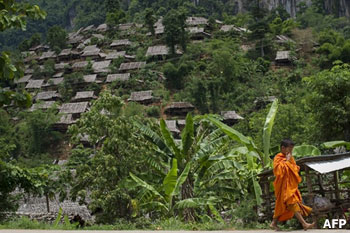Thailand’s policy of not allowing refugees to travel outside their camps along the Thai-Burmese border makes it difficult for refugees to support themselves and to develop, the Thailand-Burma Border Consortium (TBBC) said on Sunday...
Chiang Mai (Mizzima) – Thailand’s policy of not allowing refugees to travel outside their camps along the Thai-Burmese border makes it difficult for refugees to support themselves and to develop, the Thailand-Burma Border Consortium (TBBC) said on Sunday.
 EU Commissioner for International Cooperation, Humanitarian Aid and Crisis Response Kristalina Georgieva visited Mae La refugee camp on Sunday to explore ways to conduct empowerment training for refugees so that they will not need to rely on international donors in the future.
EU Commissioner for International Cooperation, Humanitarian Aid and Crisis Response Kristalina Georgieva visited Mae La refugee camp on Sunday to explore ways to conduct empowerment training for refugees so that they will not need to rely on international donors in the future.
A TBBC official, Sally Thompson, told Mizzima: ‘They need permission to go outside their refugee camps to utilize their vocational skills for their survival. But the Thai policy of not allowing them to travel outside the camps hampers this initiative. They must have access to the lowest level markets for their products’.
NGOs, including the TBBC, now provide some small-scale training for the refugees in areas including culture, handicrafts, agriculture and livestock, for their livelihood and when they can go back to their homes.
Kristalina Georgieva arrived at Thailand on Saturday. She visited Mae La camp located 57 km from Mae Sot in Tak Province and met with the camp officials the next day.
Discussions included the long-term plan for refugees to support themselves independently rather than rely on donors.
Mae La refugee camp committee chairman Saw Ton said that the chance of success for such a programme is not yet feasible under the current circumstances.
‘We can’t trust in this project yet’, he told Mizzima. ‘The camp area is so small. To make this programme a success, the Thai government must let the refugees travel and must provide them work permits’.
The EU Commission has provided 149 million Euro (US$ 200 million) to refugees on the Thai-Burmese border since 1995, the commission said in a report. It provides food, medical care, and agriculture and livestock to refugees through NGOs on the border.
On Tuesday, the EU humanitarian aid commissioner will meet with Thai Prime Minister Abhisit Vejjajiva and Foreign Minister Kasit Piromya in Bangkok to discuss education, judicial and economic issues involving refugees, according to a statement issued by the EU on March 11.
The TBBC said that third country resettlement programmes will be continued while a long-term, self-reliance program for the refugees is developed.
According to a TBBC report, in the past four years a total of 65,000 Burmese refugees have left the Mae La, Omphan, Thaphim, Noeboe, Bandonyang, Mae Laoo, Mae Ramoe and No. 1 and 2 Karenni refugee camps for third countries. Countries that have accepted these refugees from 2006 to December 2010 include the US, Canada and Australia.
There are more than 140,000 refugees in the nine refugee camps along the Thai-Burma border.


